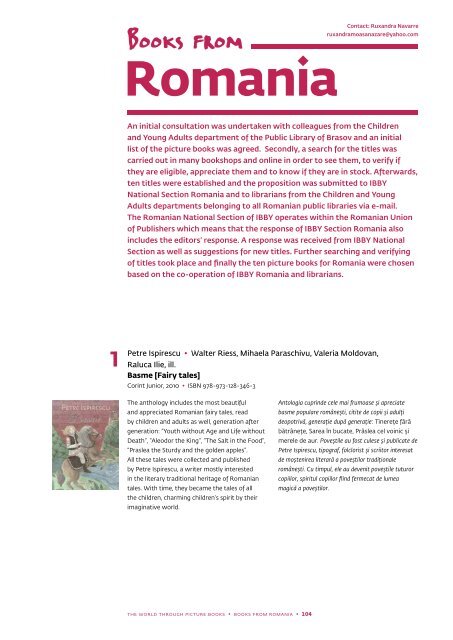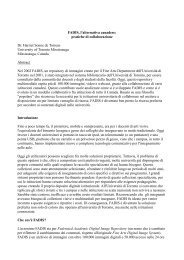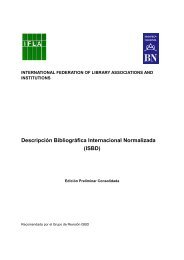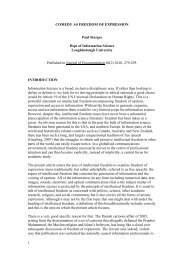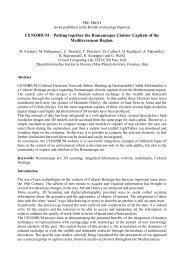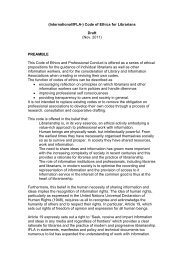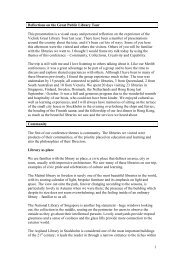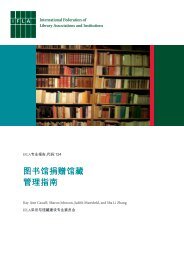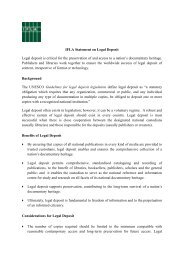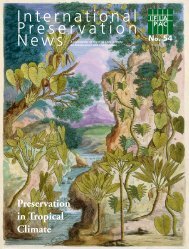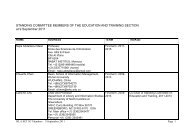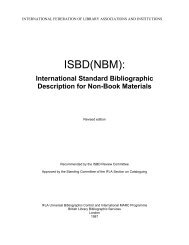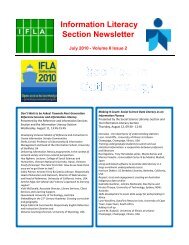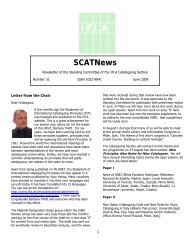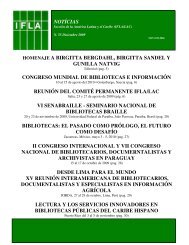English - IFLA
English - IFLA
English - IFLA
Create successful ePaper yourself
Turn your PDF publications into a flip-book with our unique Google optimized e-Paper software.
1<br />
Books from<br />
Romania<br />
An initial consultation was undertaken with colleagues from the Children<br />
and Young Adults department of the Public Library of Brasov and an initial<br />
list of the picture books was agreed. Secondly, a search for the titles was<br />
carried out in many bookshops and online in order to see them, to verify if<br />
they are eligible, appreciate them and to know if they are in stock. Afterwards,<br />
ten titles were established and the proposition was submitted to IBBY<br />
National Section Romania and to librarians from the Children and Young<br />
Adults departments belonging to all Romanian public libraries via e-mail.<br />
The Romanian National Section of IBBY operates within the Romanian Union<br />
of Publishers which means that the response of IBBY Section Romania also<br />
includes the editors’ response. A response was received from IBBY National<br />
Section as well as suggestions for new titles. Further searching and verifying<br />
of titles took place and finally the ten picture books for Romania were chosen<br />
based on the co-operation of IBBY Romania and librarians.<br />
Petre Ispirescu • Walter Riess, Mihaela Paraschivu, Valeria Moldovan,<br />
Raluca Ilie, ill.<br />
Basme [Fairy tales]<br />
Corint Junior, 2010 • ISBN 978-973-128-346-3<br />
The anthology includes the most beautiful<br />
and appreciated Romanian fairy tales, read<br />
by children and adults as well, generation after<br />
generation: “Youth without Age and Life without<br />
Death”, “Aleodor the King”, “The Salt in the Food”,<br />
“Praslea the Sturdy and the golden apples”.<br />
All these tales were collected and published<br />
by Petre Ispirescu, a writer mostly interested<br />
in the literary traditional heritage of Romanian<br />
tales. With time, they became the tales of all<br />
the children, charming children’s spirit by their<br />
imaginative world.<br />
the world through picture books • books from romania • 104<br />
Contact: Ruxandra Navarre<br />
ruxandramoasanazare@yahoo.com<br />
Antologia cuprinde cele mai frumoase şi apreciate<br />
basme populare româneşti, citite de copii şi adulţi<br />
deopotrivă, generaţie după generaţie: Tinereţe fără<br />
bătrâneţe, Sarea în bucate, Prâslea cel voinic şi<br />
merele de aur. Poveştile au fost culese şi publicate de<br />
Petre Ispirescu, tipograf, folclorist şi scriitor interesat<br />
de moştenirea literară a poveştilor tradiţionale<br />
româneşti. Cu timpul, ele au devenit poveştile tuturor<br />
copiilor, spiritul copiilor fiind fermecat de lumea<br />
magică a poveştilor.<br />
2<br />
3<br />
4<br />
Ion Creangă • Valentin Tănase, ill.<br />
Harap Alb [White Moor]<br />
Flamingo GD, [2009] • ISBN 978-973-1896-13-7<br />
The White Moor is the King’s son, the youngest<br />
and most courageous one, who leaves the<br />
family, and is forced to face many challenges<br />
and difficulties. In spite of his father’s advice, the<br />
prince was tricked by the Spân (the Beardless<br />
Man) who turns him into a slave and gives him<br />
dangerous tasks that put his life at risk. Helped<br />
by Holy Friday and his horse, and also having<br />
supernatural powers, the White Moor succeeds<br />
in all his missions. Finally, the White Moor defeats<br />
his master and regains his freedom, finding his<br />
place and true love.<br />
Mihai Eminescu • Anamaria Smigelschi, ill.<br />
Făt-Frumos din lacrimă [Prince Charming from the Tear]<br />
Gramar, 2007 • ISBN 978-973-591-570-4<br />
Born from his mother’s tears, the Prince Charming<br />
from the Tear left his home, in search of glory. He<br />
saves his neighbor’s kingdom from the curse of a<br />
witch, called Muma Pădurii (The Forest Witch),<br />
finding love with her beautiful daughter. At the<br />
request of his blood brother, he accepts the<br />
mission of bringing his brother’s future bride, the<br />
beautiful youngest daughter of the most powerful<br />
leader, Genar. After a lot of difficulties, he<br />
succeeds in his mission. The adventures, romantic<br />
atmosphere, magic characters and very poetic<br />
language give a special flavour to this tale, which<br />
captures any reader.<br />
Elena Farago • Anamaria Smigelschi, ill.<br />
Căţeluşul şchiop [The Lame Puppy]<br />
Gramar, 2006 • ISBN (10) 973-591-537-5, (13) 978-973-591-537-7<br />
Elena Farago (1878-1954) was a well known and<br />
appreciated Romanian poet. This is the story of<br />
a puppy badly hurt by a cruel boy and as a result<br />
becomes lame and is unable to play with other<br />
puppies or children. The boy’s regrets are useless,<br />
and the kind-hearted puppy did not punish<br />
him, being more generous than a human being<br />
could ever be. The poem, carrying a clear moral<br />
message, is one of the best poems known by<br />
children and it is often used as a nursery rhyme<br />
in schools, kindergartens and library reading<br />
activities.<br />
the world through picture books • books from romania • 105<br />
Harap Alb este cel mai tânăr şi curajos dintre cei trei fii<br />
ai regelui, care părăseşte familia, plecând să îşi înfrunte<br />
destinul şi trebuind să facă faţă multor provocări şi<br />
dificultăţi. În ciuda sfatului părintelui său de a evita<br />
Omul Spân şi Omul Roş, prinţul este păcălit de Spân,<br />
care îl înrobeşte şi îi dă să facă cele mai grele sarcini,<br />
dorindu-i să-şi piardă viaţa şi să îi ia locul. Ajutat<br />
de Sf. Vineri şi de calul său cu puteri supranaturale,<br />
precum şi de o serie de personaje fantastice, Harap<br />
Alb reuşeşte să ducă la bun sfârşit fiecare misiune grea<br />
încredinţată de stăpânul său. În final, Harap Alb îşi<br />
înfrânge stăpânul şi îşi recâştigă libertatea, descoperind<br />
adevărata dragoste şi locul său propriu în lume.<br />
Născut din lacrimile mamei sale, Făt Frumos din<br />
Lacrimă părăseşte casa părinţilor lui, în căutarea<br />
gloriei. El salvează împărăţia vecină de blestemul<br />
unei vrăjitoare, numită Muma Pădurii, descoperind în<br />
frumoasa ei fiică adevărata dragoste a sa. La cererea<br />
fratelui său de sânge, el acceptă misiunea de a-i aduce<br />
acestuia viitoarea mireasă, fiica unui prea puternic<br />
stăpân al locului, Genarul. După o mulţime de greutăţi,<br />
el izbândeşte în lupta sa. Aventurile, atmosfera<br />
romantică, personajele magice şi limbajul poetic<br />
expresiv conferă un aer special acestei poveşti care<br />
captivează orice cititor.<br />
Elena Farago (1878-1954) a fost o cunoscută şi<br />
apreciată poetă română. Poemul intitulat Căţeluşul<br />
şchiop este povestea unui căţel rănit grav de un băiat<br />
crud. Din cauza acelui accident nefericit, căţeluşul<br />
devine şchiop şi nu se mai poate juca cu ceilalţi<br />
căţeluşi sau cu copiii. Regretele băiatului sunt inutile,<br />
dar generosul căţel nu îl pedepseşte, dovedindu-se mai<br />
generos decât a fost băiatul. Poemul, cu un evident<br />
mesaj moral, este unul dintre cele mai cunoscute<br />
creaţii ale poetei de către copii, folosit adesea în<br />
activităţie pedagogice din grădiniţe, şcoli şi biblioteci.


